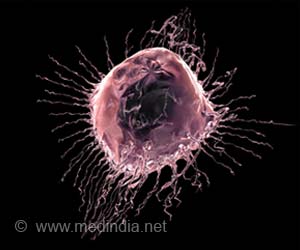Researchers study the role of protein systems, such as Ras in cancer cell growth.

‘Scientists show how Ras protein binds to cell membranes and impacts the signaling pathways that cause rapid and uncontrolled growth of cancer cells.’





Stephen Sligar and his team have found that the KRas4b form of Ras protein binds more tightly to the cell membrane, but it needs to attach on the correct side. One side of the KRas4b protein associates with signaling partners; if this side binds to the membrane, then it's not able to interact with its partners, but if the inactive side binds to the membrane, then the active side is available to engage in the downstream signaling process that could enable cancer. Sligar' s team discovered that fatty acids in KRas4b help control which side attaches to the cell membrane.
"The membrane is playing a very critical role in controlling the activity of very complex signaling networks that involve many different protein molecules, Sligar said. "It is now becoming appreciated how much the membrane composition can dictate how these molecules are recruited to the membrane surface, and then how they go about their business."
In the long term, the revitalized interest in the biophysics of KRas4b, and its interaction with the membrane, will hopefully guide the discovery and design of pharmaceuticals for the treatment of cancer.
Source-Eurekalert















